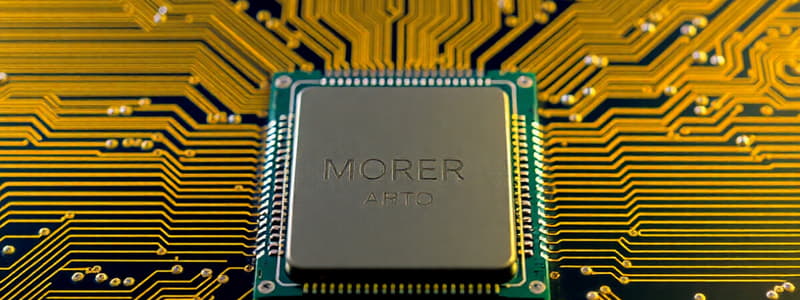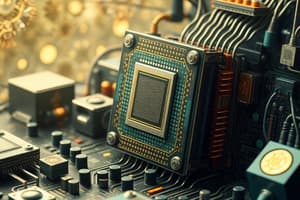Podcast
Questions and Answers
What does Moore's Law primarily describe?
What does Moore's Law primarily describe?
- The trend of technology evolving at an exponential rate. (correct)
- The performance differences between Intel and AMD processors.
- The relationship between CPU speed and RAM.
- The capacity of hard drives in modern computing devices.
Which component is NOT typically associated with the function of a CPU?
Which component is NOT typically associated with the function of a CPU?
- Graphics processing unit (GPU) (correct)
- Control unit
- Memory cache
- Arithmetic logic unit (ALU)
What is the primary function of RAM in a computer system?
What is the primary function of RAM in a computer system?
- To temporarily hold data and instructions for the CPU. (correct)
- To manage the flow of power to other components.
- To permanently store data and applications.
- To execute software applications directly.
What is primarily responsible for a CPU's processing power?
What is primarily responsible for a CPU's processing power?
Which of the following is a major type of nonvolatile storage drive?
Which of the following is a major type of nonvolatile storage drive?
Which of the following storage types is volatile?
Which of the following storage types is volatile?
In the machine cycle of a CPU, what is the correct order of operations?
In the machine cycle of a CPU, what is the correct order of operations?
Which technology allows a CPU to execute multiple processes simultaneously?
Which technology allows a CPU to execute multiple processes simultaneously?
Which type of RAM is the latest standard available?
Which type of RAM is the latest standard available?
What is one of the considerations when selecting a computing device?
What is one of the considerations when selecting a computing device?
Which of the following features is typically associated with video cards?
Which of the following features is typically associated with video cards?
What does SuperFetch do in a computer system?
What does SuperFetch do in a computer system?
What is an important step to optimize a system's reliability?
What is an important step to optimize a system's reliability?
What type of storage drive utilizes magnetized spots for data saving?
What type of storage drive utilizes magnetized spots for data saving?
What limits the amount of RAM that can be added to a computer?
What limits the amount of RAM that can be added to a computer?
Which of the following accurately describes cache memory?
Which of the following accurately describes cache memory?
Which characteristic is NOT associated with solid state drives?
Which characteristic is NOT associated with solid state drives?
What is a key feature of RAID 1?
What is a key feature of RAID 1?
What type of technology does a sound card utilize for enhanced audio experience?
What type of technology does a sound card utilize for enhanced audio experience?
Which of the following is not a recommended step to maintain system reliability?
Which of the following is not a recommended step to maintain system reliability?
What must be done when facing system crashes?
What must be done when facing system crashes?
What type of display connector is NOT typically used for connecting video cards?
What type of display connector is NOT typically used for connecting video cards?
Which component is essential for video display alongside a monitor?
Which component is essential for video display alongside a monitor?
What is a feature unique to solid state hybrid drives compared to solid state drives?
What is a feature unique to solid state hybrid drives compared to solid state drives?
Flashcards are hidden until you start studying
Study Notes
Moore's Law
- Explains the exponential growth of computing power over time
- States that the number of transistors on a microchip doubles approximately every two years
- This leads to improvements in CPU speed, memory, and storage capacity
Selecting a Computing Device
- Many choices exist, including smartphones, tablets, ultrabooks, 2-in-1s, laptops, and desktops
- Consider factors like intended use, portability, performance requirements, and budget
How the CPU Works
- Located on the motherboard, the CPU processes instructions, performs calculations, and manages information flow
- Intel and AMD are major manufacturers of CPUs
- The CPU operates through a machine cycle consisting of fetch, decode, execute, and store
- The CPU's control unit coordinates the steps of the machine cycle
- The arithmetic logic unit (ALU) performs arithmetic and logical operations
- CPU performance is influenced by clock speed, overclocking, number of cores, parallel processing, and cache memory
Measuring CPU Performance
- Benchmarks are used to evaluate CPU performance by running standardized tests
- Different benchmarks focus on different aspects, such as overall speed, specific tasks, or power efficiency
Random Access Memory (RAM)
- Short-term memory storage that is volatile, meaning data is lost when the power is off
- Used to hold data and instructions that the CPU is actively using
- Types include DDR3, DDR4, and DDR5
- Memory modules, such as DIMMs, are used to connect RAM to the motherboard
Adding RAM
- The amount of RAM that can be added is limited by the motherboard's capacity
- Installing additional RAM is typically easy and can significantly improve system performance
Types of Storage Drives
- Mechanical hard drives store data on platters coated with magnetic material
- Data is saved as patterns of magnetized spots representing 1s and 0s
- Access time is the time taken to locate and retrieve data
- Solid-state drives (SSDs) store data using flash memory, offering faster access times, lower heat generation, and lower power consumption
- Solid-state hybrid drives (SSHDs) combine a small SSD portion with a traditional hard drive, balancing performance and cost
Storage Needs
- Consider the amount of data you need to store, including operating system, programs, and files
- RAID (Redundant Array of Independent Disks) provides data redundancy and fault tolerance
- RAID 0 stripes data across multiple drives for faster performance
- RAID 1 mirrors data onto multiple drives for data protection
Video Cards
- Used to process and output video signals
- Feature ports like HDMI, DVI, and DisplayPort adapter
- Video memory stores graphics data for faster rendering
- Screen resolution determines the sharpness and detail of the image displayed
- The Graphics Processing Unit (GPU) is a specialized processor dedicated to graphics rendering
Sound Cards
- Used to produce sound through speakers
- 3D sound technology simulates realistic audio experiences
- Surround sound creates an immersive audio environment
- Dolby Digital 7.1 is a surround sound configuration with 7.1 channels
- MIDI interface allows communication with musical instruments and digital audio workstations
Maintaining System Reliability
- Install antivirus software to protect against malware
- Install spyware and adware detection programs to prevent unwanted tracking and advertising
- Regularly clear out unnecessary files to free up storage space
- Use Disk Defragmenter to optimize disk space and improve performance
- Automate key utilities like disk cleanup and system updates for easier maintenance
System Crashes
- Try System Restore to revert the system to an earlier state
- Check RAM for errors or insufficiency
- Investigate error codes and search for solutions online
- Consider a Windows Reset as a last resort
Getting Rid of Your Old Computer
- Research local recycling centers or e-waste disposal facilities
- Check if your local municipality offers electronic waste pickup services
- Consider donating your computer to charities or organizations that refurbish and repurpose devices
- Securely erase all personal data before disposing of or donating your computer
Studying That Suits You
Use AI to generate personalized quizzes and flashcards to suit your learning preferences.




